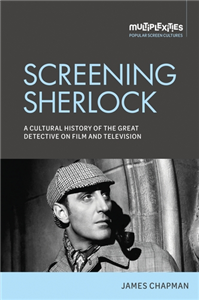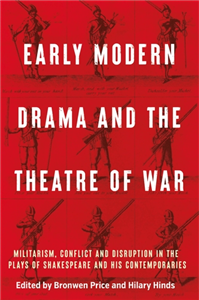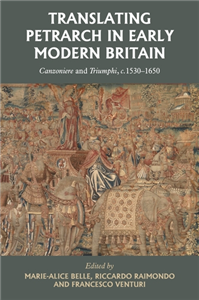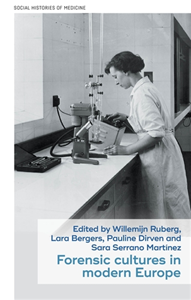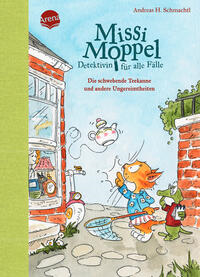Your Search Results
-
Modjaji Books
Modjaji Books is a small, independent, feminist publishing company, that started in 2007 in Cape Town.
View Rights Portal
-
Promoted ContentThe ArtsFebruary 2025
Tattoos in crime and detective narratives
Marking and remarking
by Kate Watson, Katharine Cox
Tattoos in crime and detective narratives examines representations of the tattoo and tattooing in literature, television and film, from two periods of tattoo renaissance (1851-1914, and c1955 to present). It makes an original contribution to understandings of crime and detective genre and the ways in which tattoos act as a mimetic device that marks and remarks these narratives in complex ways. With a focus on tattooing as a bodily narrative, the book incorporates the critical perspectives of posthumanism, spatiality, postcolonialism, embodiment and gender studies. The grouped essays examine the first tattoo renaissance, the rebirth of the tattoo in contemporary culture through literature, children's literature, film and television. The collection has a broad appeal, and will be of interest to all literature and media scholars, but in particular those with an interest in crime and detective narratives and skin studies.
-
Promoted ContentThe ArtsFebruary 2025
Screening Sherlock
A cultural history of the Great Detective on film and television
by James Chapman
Screening Sherlock is the first book-length academic study of the film and television career of the most famous detective in fiction. Chapman explores the contexts, adaptation strategies and critical reception of Sherlock Holmes (and Dr Watson) on film and television in Britain and the United States. The book includes case studies of such famous Holmes impersonators as William Gillette, Basil Rathbone, Peter Cushing, Jeremy Brett and Benedict Cumberbatch, as well as charting a path through many lesser-known productions. From early cinema to the Hollywood studio system, and from heritage drama to contemporary postmodern television, Screening Sherlock is an indispensible work for all aficionados of Arthur Conan Doyle's consulting detective of Baker Street.
-
 Trusted Partner
Humanities & Social SciencesMay 2009
Trusted Partner
Humanities & Social SciencesMay 2009Consumerism and the Co-operative movement in modern British history
Taking stock
by Lawrence Black, Nicole Robertson
Despite the abundance and quality of recent historical writing on consumerism, it cannot be said that the modern Co-operative movement (Co-op) has been well served. It has also been by-passed in studies that locate Britons' identity in their consumption. The reasons for this can be found in the widely perceived decline of the Co-op since the 1950s, but also in various historiographical agendas that have resulted in its relative invisibility in modern British history. This book, by demonstrating the variety of broader issues that can be addressed through the Co-op and the vibrancy of new historical research into consumption, seeks to remedy this. Taking stock, both of the Co-op in a broader context and of new approaches to the history of consumption, combines the work of leading authorities on the Co-op with recent scholarly research. It explores the Co-op's distinctive interface between everyday issues and grander idealistic concerns. The chapters intersect to examine a broad range of themes, notably: the politics of consumerism including consumer protection, ethical and fair trading and alternatives to corporate commerce; design and advertising; the Co-op's relations with other components of the labour movement; and its ideology, image and memory. The collection looks at the Co-operative movement locally (through specific case studies), nationally and also in comparison to the European movement. This collection will appeal to academics, researchers, teachers and students of the economic, cultural and political history of twentieth-century Britain. It will also be of interest to academics and students of business studies, and co-operative members themselves. ;
-
 Trusted Partner
The ArtsJune 2025
Trusted Partner
The ArtsJune 2025Death in modern theatre
Stages of mortality
by Adrian Curtin
Death in modern theatre offers a unique account of modern Western theatre, focusing on the ways in which dramatists and theatre-makers have explored historically informed ideas about death and dying in their work. It investigates the opportunities theatre affords to reflect on the end of life in a compelling and socially meaningful fashion. In a series of interrelated, mostly chronological, micronarratives beginning in the late nineteenth century and ending in the early twenty-first century, this book considers how and why death and dying are represented at certain historical moments using dramaturgy and aesthetics that challenge audiences' conceptions, sensibilities, and sense-making faculties. It includes a mix of well-known and lesser-known plays from an international range of dramatists and theatre-makers, and offers original interpretations through close reading and performance analysis.
-
 Trusted Partner
Literature & Literary StudiesOctober 2025
Trusted Partner
Literature & Literary StudiesOctober 2025Early modern drama and the theatre of war
Militarism, conflict and disruption in the plays of Shakespeare and his contemporaries
by Bronwen Price, Hilary Hinds
This volume explores the disruptive effects of militarism, war and social unrest in early modern drama. Engaging with Simon Barker's seminal work on dramatic representations of war and militarism, contributors highlight what often lies hidden beneath the surface of martial narratives, treating them as formative interventions in contemporary discourses, whether in justifying war, excluding dissident voices or shaping cultural identities. Discussions include new examinations of militarism, the figure of the soldier and early modern theories of war in Shakespearean tragedy, history and comedy, alongside antimasque and dramatic satire by lesser-known playwrights. The essays investigate how ideas of war underpin emerging concepts of gender, leadership, marriage and the family, as well as the continuing mobilisation of Shakespearean drama in the context of modern armed conflict. Together, they offer rich new contributions to the current lively critical debates on this topic.
-
 Trusted Partner
Literature & Literary StudiesAugust 2025
Trusted Partner
Literature & Literary StudiesAugust 2025Translating Petrarch in early modern Britain
Canzoniere and Triumphi, c. 1530–1650
by Marie-Alice Belle, Riccardo Raimondo, Francesco Venturi
Translating Petrarch in early modern Britain gathers twelve essays by international scholars focusing on the translation of Petrarch's vernacular verse (Canzoniere and Triumphi) into English, from the Tudor age to the mid-seventeenth century (and beyond). Approaching translation as an interpretive process, but also a mode of literary emulation and cultural engagement with Petrarch's prestigious precedent, the collection explores the complex and interconnected trajectories of both poetic works in English and Scottish literary milieux. While situating each translation in its distinct historical, material, and literary context, the essays trace the reception of Petrarch's works in early modern Britain through the combined processes of linguistic and metric innovation, literary imitation, musical adaptation and cultural and material 'domestication'. The collection sheds light on the origins and development of early modern English Petrarchism as part of wider transnational - and indeed, translational-European literary culture.
-
 Trusted Partner
Humanities & Social SciencesDecember 2008
Trusted Partner
Humanities & Social SciencesDecember 2008The family tree detective
Tracing your ancestors in England and Wales
by Colin Rogers
The long-awaited fourth edition of this best-selling manual continues to offer up-to-date guidance both to newcomers and to the more experienced, on how to make best use of the labyrinth of genealogical sources in England and Wales. It takes into account recent, and even some future, changes to the civil registration system, and incorporates many of the vast sources newly available on the internet. There is also a substantial bibliography for those who discover that their ancestors migrated from other countries. New appendices provide research into underregistration of birth and death, and hitherto unpublished details from the 1915 and 1939 National Registers. The family tree detective remains an indispensible source of information on how to locate births, marriages and deaths, and alternative strategies if those searches fail. Dr Colin D. Rogers is a Fellow of the Society of Genealogists, a member of AGRA (the Association of Genealogists and Researchers in Archives), and was for thirty years the Hon. General Editor of the Lancashire Parish Register Society. He runs a consultancy helping banks and solicitors to identify and locate beneficiaries. ;
-
 Trusted Partner
Humanities & Social SciencesAugust 2023
Trusted Partner
Humanities & Social SciencesAugust 2023Forensic cultures in modern Europe
by Willemijn Ruberg, Lara Bergers, Pauline Dirven, Sara Serrano Martínez
This edited volume examines the performance and role of scientific experts in modern European courts of law and police investigations. It discusses cases from criminal, civil and international law to parse the impact of forensic evidence and expertise in different European countries. The contributors show how modern forensic science and technology are inextricably entangled with political ideology, gender norms and changes in the law and legal systems. Discussing fascinating case studies, they highlight how the ideology of authoritarian and liberal regimes has affected the practical enactment of forensic expertise. They also emphasise the influence of images of masculinity and femininity on the performance of experts and on their assessment of evidence, victims and perpetrators. This book is an important contribution to our knowledge of modern European forensic practices.
-
 Trusted Partner
Literature & Literary StudiesJune 2021
Trusted Partner
Literature & Literary StudiesJune 2021Sara Paretsky
Detective fiction as trauma literature
by Cynthia Hamilton
Sara Paretsky is known for her influential V.I. Warshawski series, which transformed the masculine hard-boiled detective formula into a vehicle for feminist values. But Paretsky does more than this. Her novels also illustrate the extent to which detective fiction acts as a literature of trauma, allowing Paretsky to address the politics of agency in ways that go beyond the personal, for trauma always has a social and a political dimension. Paretsky's work also exploits the way detective fiction mirrors the writing of history. Here, Paretsky uses the form to expose the partiality of historical accounts - whether they be personal, institutional, or national - that authorise 'forgetting' of a particularly insidious kind. Significantly, all these issues are explored within the framework of the traditional hard-boiled detective novel. As a result, Paretsky's achievement forces us to acknowledge the deeply subversive potential of detective fiction.
-
 Trusted Partner
Literature & Literary StudiesJune 2022
Trusted Partner
Literature & Literary StudiesJune 2022The early modern English sonnet
Ever in motion
by Laetitia Sansonetti, Rémi Vuillemin, Enrica Zanin
This volume questions and qualifies commonly accepted assumptions about the early modern English sonnet: that it was a strictly codified form, most often organised in sequences, which only emerged at the very end of the sixteenth century and declined as fast as it had bloomed, and that minor poets merely participated in the sonnet fashion by replicating established conventions. Drawing from book history and relying on close reading and textual criticism, this collection offers a more nuanced account of the history of the sonnet. It discusses how sonnets were written, published and received in England as compared to mainland Europe, and explores the works of major (Shakespeare, Sidney, Spenser) and minor (Barnes, Harvey) poets alike. Reflecting on current editorial practices, it also provides the first modern edition of an early seventeenth-century Elizabethan miscellany including sonnets presumably by Sidney and Spenser.
-
 Trusted Partner
Children's & YA
Trusted Partner
Children's & YAMissi Moppel - Detective for all Cases (2). The Floating Teapot and other Weird Wonders
by Andreas H. Schmachtl
The master detective is after a cunning thief who steals colourful, random objects like Leonardo da Vinci’s paintbrush or antique sugar bowls. During a visit to Grandpa Pots, she uncovers the secret of Ghost Island and solves the puzzle of the floating teapot in Mr Goldrand’s junk shop. Only the nasty blackmailing letters from the mysterious “Magpie” present her with a seemingly insoluble mystery. Someone is testing the powers of the great investigator to their very limit…Will she be able to crack even this case? 15 original detective stories told in masterly fashion by the Spiegel bestselling author Andreas H. Schmachtl.
-
 Trusted Partner
Humanities & Social SciencesJune 2026
Trusted Partner
Humanities & Social SciencesJune 2026Women in exile in early modern Europe and the Americas
by Linda Levy Peck, Adrianna E. Bakos
-
 Trusted Partner
Literature & Literary StudiesAugust 2023
Trusted Partner
Literature & Literary StudiesAugust 2023Poison on the early modern English stage
Plants, paints and potions
by Lisa Hopkins, Bill Angus
Many early modern plays use poison, most famously Hamlet, where the murder of Old Hamlet showcases the range of issues poison mobilises. Its orchard setting is one of a number of sinister uses of plants which comment on both the loss of horticultural knowledge resulting from the Dissolution of the Monasteries and also the many new arrivals in English gardens through travel, trade, and attempts at colonisation. The fact that Old Hamlet was asleep reflects unease about soporifics troubling the distinction between sleep and death; pouring poison into the ear smuggles in the contemporary fear of informers; and it is difficult to prove. This book explores poisoning in early modern plays, the legal and epistemological issues it raises, and the cultural work it performs, which includes questions related to race, religion, nationality, gender, and humans' relationship to the environment.
-
 Trusted Partner
Literature & Literary StudiesApril 2021
Trusted Partner
Literature & Literary StudiesApril 2021Positive emotions in early modern literature and culture
by Cora Fox, Bradley J. Irish, Cassie M. Miura
-
 Trusted Partner
Literature & Literary StudiesNovember 2019
Trusted Partner
Literature & Literary StudiesNovember 2019Transnational connections in early modern theatre
by Pavel Drábek, M. A. Katritzky
-
 Trusted Partner
Humanities & Social SciencesApril 2020
Trusted Partner
Humanities & Social SciencesApril 2020Early modern war narratives and the Revolt in the Low Countries
by Raymond Fagel, Leonor Álvarez Francés, William G. Naphy, Beatriz Santiago Belmonte
-
 Trusted Partner
Literature & Literary StudiesApril 2020
Trusted Partner
Literature & Literary StudiesApril 2020The early modern English sonnet
by Laetitia Sansonetti, Rémi Vuillemin, Enrica Zanin, Tamsin Badcoe
-
 Trusted Partner
Literature & Literary StudiesMarch 2020
Trusted Partner
Literature & Literary StudiesMarch 2020Enacting the Bible in medieval and early modern drama
by Chanita Goodblatt, Eva von Contzen, David Matthews
-
 Trusted Partner
Literature & Literary StudiesAugust 2024
Trusted Partner
Literature & Literary StudiesAugust 2024Instead of modernity
The Western canon and the incorporation of the Hispanic (c. 1850–75)
by Andrew Ginger
Instead of modernity goes to the very heart of comparative cultural study: the question of what happens when intimate, dynamic connections are made over place and time, what it is to feel at home amid the lavish diversity of culture. This ambitious interdisciplinary book reconsiders foundational figures of the modern western canon, from Darwin to Cameron, Baudelaire to Whistler. It weaves together brain images from France, preserved insects from the Americas, glass in London, poetry from Argentina, paintings from Spain. Flaubert, Whitman, and Nietzsche find themselves with Hostos from Puerto Rico and Gorriti from Argentina. The book ranges over theoretical fields: trauma and sexuality studies, theories of visuality, the philosophy of sacrifice and intimacy, the thought of Wittgenstein. Instead of modernity is an adventure in the practice of comparative writing: resonances join suggestively over place and time, the textures of words, phrases and images combine to form moods.
-
 Trusted Partner
Humanities & Social SciencesSeptember 2018
Trusted Partner
Humanities & Social SciencesSeptember 2018The social world of early modern Westminster
Abbey, court and community, 1525–1640
by Peter Lake, J. F. Merritt, Anthony Milton, Jason Peacey, Alexandra Gajda
Early modern Westminster is familiar as the location of the Royal Court at Whitehall, parliament, the law courts and the emerging West End, yet it has never been studied in its own right. This book is the first study to provide an integrated picture of the town during this crucial period in its history. It reveals the often problematic relations between the diverse groups of people who constituted local society - the Court, the aristocracy, the Abbey, the middling sort and the poor - and the competing visions of Westminster's identity which their presence engendered. Different chapters study the impact of the Reformation and of the building of Whitehall Palace; the problem of poverty and the politics of communal responsibility; the character and significance of the increasing gentry presence in the town; the nature and ideology of local governing elites; the struggles over the emerging townscape; and the changing religious culture of the area, including the problematic role of the post-Reformation Abbey. A comprehensive study of one of the most populous and influential towns in early modern England, this book covers the entire period from the Reformation to the Civil War. It will make fascinating reading for historians of English society, literature and religion in this period, as well as enthusiasts of London's rich history.





